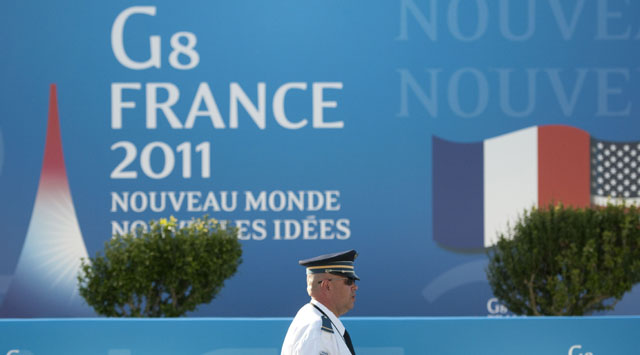The leaders of eight world's richest countries (G8) will begin on Thursday a two-day summit in Deauville (France) focused on helping to consolidate democratic movements in the "Arab spring." World leaders will devote the first day and dinner most of his second day to address the demands for political change in North Africa and Middle East.
Nuclear safety after the accident at the Japanese central Fukushima and its implications for energy policy, climate change, development and regulation of the Internet are other main topics of the agenda organized by the French president and host, Nicolas Sarkozy. The fragility of economic recovery and the debt crisis in the eurozone focus the lunch which will start at 10.45 GMT, the summit brings together Sarkozy, U.S.
President, Barack Obama, Russia's Dmitri Medvedev, and Prime Ministers of Japan, UK, Italy and Canada, along with German Chancellor Angela Merkel. The first lunch meeting also includes the involvement of Japanese Prime Minister, Naoto Kan, who will report the situation in his country after the earthquake of March and the subsequent disaster at the nuclear plant in Fukushima.
The first workshop will focus on nuclear safety and the need to respond to public concern after the accident in Fukushima. The French presidency of the G-8 meeting has chained the other nuclear policy on climate change, arguing that nuclear power is key to limiting global warming emissions.
Thus, the aim is for countries that have announced they will close their nuclear plants, in reference to Germany to explain how they intend to comply without them commitments to reduce carbon dioxide emissions in coming decades. G8 leaders will devote the first time a working session to the Internet, finding a balance between freedom on the Internet and state control for the protection of children, combating terrorism and safeguarding the intellectual property.
In an Internet forum held in Paris on Wednesday highlighted the influence of new technologies as a means of economic development and citizens' movements engine such as North Africa or you live these days in Spain. Dinner this first day was devoted to the Arab revolution, with a journey through many different situations, including Tunisia, Egypt, Libya, Syria and Yemen.
Address other issues related to that part of the world, the challenges posed by the Iranian regime, the consequences of the death of Al Qaeda chief Osama bin Laden, especially Afghanistan and Pakistan. The Deauville meeting held just a week after Obama's speech on the Middle East where the U.S.
president declared his support for the democratic demands in the region as a priority of his government's foreign policy. 


Nuclear safety after the accident at the Japanese central Fukushima and its implications for energy policy, climate change, development and regulation of the Internet are other main topics of the agenda organized by the French president and host, Nicolas Sarkozy. The fragility of economic recovery and the debt crisis in the eurozone focus the lunch which will start at 10.45 GMT, the summit brings together Sarkozy, U.S.
President, Barack Obama, Russia's Dmitri Medvedev, and Prime Ministers of Japan, UK, Italy and Canada, along with German Chancellor Angela Merkel. The first lunch meeting also includes the involvement of Japanese Prime Minister, Naoto Kan, who will report the situation in his country after the earthquake of March and the subsequent disaster at the nuclear plant in Fukushima.
The first workshop will focus on nuclear safety and the need to respond to public concern after the accident in Fukushima. The French presidency of the G-8 meeting has chained the other nuclear policy on climate change, arguing that nuclear power is key to limiting global warming emissions.
Thus, the aim is for countries that have announced they will close their nuclear plants, in reference to Germany to explain how they intend to comply without them commitments to reduce carbon dioxide emissions in coming decades. G8 leaders will devote the first time a working session to the Internet, finding a balance between freedom on the Internet and state control for the protection of children, combating terrorism and safeguarding the intellectual property.
In an Internet forum held in Paris on Wednesday highlighted the influence of new technologies as a means of economic development and citizens' movements engine such as North Africa or you live these days in Spain. Dinner this first day was devoted to the Arab revolution, with a journey through many different situations, including Tunisia, Egypt, Libya, Syria and Yemen.
Address other issues related to that part of the world, the challenges posed by the Iranian regime, the consequences of the death of Al Qaeda chief Osama bin Laden, especially Afghanistan and Pakistan. The Deauville meeting held just a week after Obama's speech on the Middle East where the U.S.
president declared his support for the democratic demands in the region as a priority of his government's foreign policy.



No comments:
Post a Comment